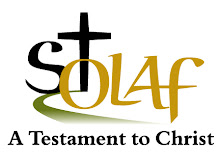On February 3rd we celebrate the Feast of St. Blaise. St. Blaise was a bishop in Armenia, over 1600 years ago.
Legend says that St. Blaise lived alone in woods, more or less like Jesus did when he spent the 40 days in the desert fasting and praying. It is said that the animals of the forest would come to him when they were injured or sick and he would heal them. Another legend tells us that he saved a boy from choking on a fish bone. And ever since then people have prayed for St. Blaise to cure them of illnesses particularly ones to do with the throat.
Today many parishes have a blessing of the throats on St. Blaise’s feast day. At St. Olaf this will happen on Tuesday, February 3rd during the 8:30 AM daily Mass. The candles used to bless the throats are themselves blessed on February 2nd which is Candlemas day (that is the day candles used throughout the year are blessed). The priest will cross 2 candles and hold them by people’s necks and he says a blessing as he does this. This comes during a good time of the year since flu season is in full swing so an extra blessing for good health is always welcome.
Another time we take care of those ailing in our churches is through the Sacrament of the Sick. We pray for the healing of those who are sick and the priest anoints them with the Oil of the Sick. During Lent we will be celebrating during the weekend Masses on the weekend of March 14th and 15th. We can find the roots of this sacrament in the 5th chapter of James in the New Testament of the Bible. Many times we are too embarrassed and do not want anyone to know we are ill or if we are healthy want to stay clear of those who are obviously ill or at times stay away from those who are maybe not so obviously ill as well. As Christians that is not what we are called to, we are called to love and care for those who are ill whether it be an obvious illness or one that is not so obvious. That is one of the reason we have this sacrament to lovingly touch them with the healing oil. This sacrament is a sign of God’s love for us.
(from Take Me Home, Too; ©1997, LTP)
GIFT Snow Day!
14 years ago



